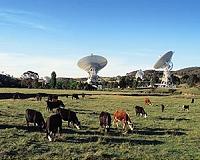 |
San Diego CA (SPX) May 26, 2010 Northrop Grumman has successfully completed flight testing of an airborne satellite communications system, part of a network that will significantly enhance communications capabilities for warfighters. This represents the first airborne terminal system to be certified for connection to the Wideband Global Satellite (WGS). The flight test used the communications terminal system installed on a modified business jet aircraft to connect with a WGS via the Ka-band link. The test - which measured terminal performance including high data rates - is the second of three phases required to certify the airborne communications system for WGS operations. "This is a tremendous step forward in realizing the objective of a redundant, robust and multi-layered approach to airborne communications and ISR (intelligence, surveillance and reconnaissance) dissemination that our senior leaders and warfighters deserve. It was really a superb joint effort involving close Army, Navy and Air Force cooperation and partnerships throughout the test phases," said Craig Lucas, program director for the U.S. Army Communications-Electronics Research, Development and Engineering Center (CERDEC). Northrop Grumman is performing the certification under the Multi-Role Tactical Common Data Link (MR-TCDL) Developmental and Operational Test program contract. The MR-TCDL system provides combat personnel with critical real-time networking connectivity by enabling extremely fast exchange of data via ground, airborne and satellite networks. "MR-TCDL's ability to dynamically route IP data seamlessly between space, aerial and ground layers is why it's the centerpiece of joint aerial layered networking concepts. This successful demonstration of airborne Ka access is critical to achieving this end," said Dave Gay, global communications division chief for U.S. Strategic Command. The Defense Micro-Electronics Activity awarded the 30-month, $69 million MR-TCDL contract to support CERDEC. The WGS satellites are elements of a system that increases U.S. communications capabilities, supporting the U.S. Department of Defense's war-fighting information exchange requirements, enabling execution of tactical command, control, communications, computers, intelligence, surveillance, and reconnaissance (C4ISR); battle management; and combat support information. The Ka-band WGS link uses a less-congested frequency band than other satellites and enables high data-rate information assimilation by airborne and ground-based terminals. Northrop Grumman's teammates on the program include U.S. Strategic Command, Offutt Air Force Base, Neb.; L-3 Communications South West, Salt Lake City, Utah; Alpha Research and Technology Inc., El Dorado Hills, Calif., and Orion Air Group, Tucson, Ariz.
Share This Article With Planet Earth
Related Links Northrop Grumman Space Technology News - Applications and Research
 American Honour For Australian Space Tracking Stations
American Honour For Australian Space Tracking StationsTidbinbilla, Australia (SPX) May 25, 2010 The Canberra Deep Space Communication Complex (CDSCC) at Tidbinbilla and former tracking stations, Honeysuckle Creek and Orroral Valley, near Canberra, will be honoured tomorrow by the American Institute of Aeronautics and Astronautics (AIAA) as sites of Historic Aerospace Significance. Managed by CSIRO Astronomy and Space Science (CASS), the CDSCC will host a plaque-unveiling ceremony at ... read more |
|
| The content herein, unless otherwise known to be public domain, are Copyright 1995-2010 - SpaceDaily. AFP and UPI Wire Stories are copyright Agence France-Presse and United Press International. ESA Portal Reports are copyright European Space Agency. All NASA sourced material is public domain. Additional copyrights may apply in whole or part to other bona fide parties. Advertising does not imply endorsement,agreement or approval of any opinions, statements or information provided by SpaceDaily on any Web page published or hosted by SpaceDaily. Privacy Statement |